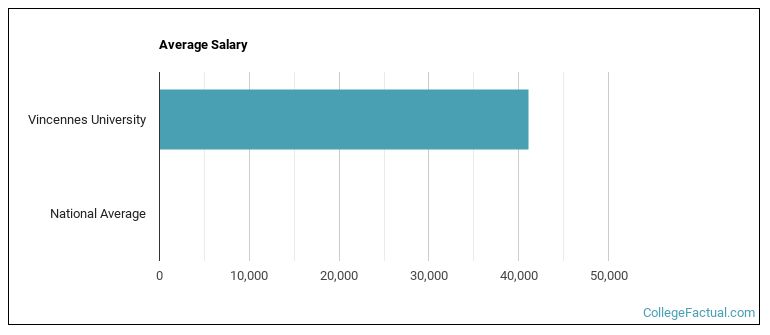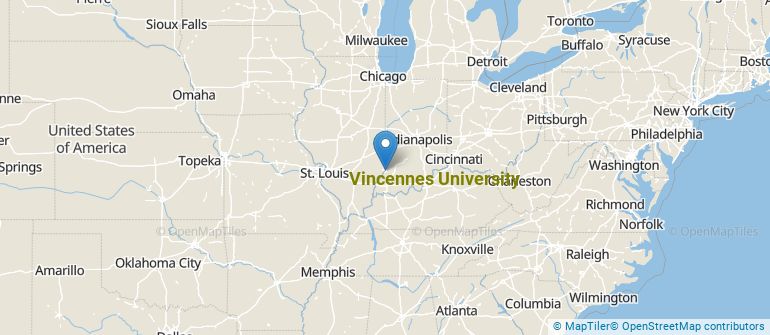 by our College Data Analytics Team
by our College Data Analytics Team
In its yearly rankings, College Factual analyzes over 2,000 colleges and universities to determine which ones are the best in a variety of categories, such as overall value, quality, diversity, which schools are the best for each major, and much more.
Vincennes University was awarded 32 badges in the 2025 rankings. The highest ranked major at the school is liberal arts general studies.
Explore the best ranked schools for the programs you are most interested in.
According to College Factual's 2025 analysis, Vincennes University is ranked #365 out of 2,152 schools in the nation that were analyzed for overall quality. This puts it in the top 20% of all schools in the nation. This is an improvement over the previous year, when Vincennes University held the #544 spot on the Best Overall Colleges list.
Vincennes University is also ranked #9 out of 41 schools in Indiana.
Vincennes University has an open admissions policy, so you should not have much trouble being accepted by the school. Still, it is important to fill out the application completely and submit any requested materials, which may include proof that you have a high school diploma or the equivalent.
The student to faculty ratio at Vincennes University is 23 to 1, which is high when compared to the national average of 15 to 1. This may indicate that some of your classes will be larger in size than they would be at other schools. However, upper level classes will probably be smaller.
When estimating how much access students will have to their teachers, some people like to look at what percentage of faculty members are full time. This is because part-time teachers may not have as much time to spend on campus as their full-time counterparts.
The full-time faculty percentage at Vincennes University is 22%. This is lower than the national average of 47%.
The freshmen retention rate tells us what percentage of first-year, full-time students choose to continue on to their sophomore year at a particular school. The rate at Vincennes University is 67%, which is about average when compared to the national rate of 68%.
When we say that a student has graduated on time, we mean that they have finished their bachelor's degree within four years. The on-time graduation rate at Vincennes University is 4%. That's lower than the national rate of 33.3%
Find out more about the retention and graduation rates at Vincennes University.
During the 2017-2018 academic year, there were 16,048 undergraduates at Vincennes University with 4,405 being full-time and 11,643 being part-time.
| $0-30 K | $30K-48K | $48-75 | $75-110K | $110K + |
|---|---|---|---|---|
| $5,315 | $7,290 | $10,791 | $12,883 | $13,506 |
The net price is calculated by adding tuition, room, board and other costs and subtracting financial aid.Note that the net price is typically less than the published for a school. For more information on the sticker price of Vincennes University, see our tuition and fees and room and board pages.
While almost two-thirds of students nationwide take out loans to pay for college, the percentage may be quite different for the school you plan on attending. At Vincennes University, approximately 37% of students took out student loans averaging $5,276 a year. That adds up to $21,104 over four years for those students.

See which majors at Vincennes University make the most money.
Get more details about the location of Vincennes University.

Contact details for Vincennes University are given below.
| Contact Details | |
|---|---|
| Address: | 1002 N First St, Vincennes, IN 47591 |
| Phone: | 812-888-8888 |
| Website: | https://www.vinu.edu/ |
| Most Popular Majors | Bachelor’s Degrees | Average Salary of Graduates |
|---|---|---|
| Liberal Arts General Studies | 1,481 | NA |
| Design & Applied Arts | 1,481 | NA |
| Electromechanical Engineering Technology | 283 | NA |
| Nursing | 154 | $62,778 |
| Vehicle Maintenance & Repair | 146 | NA |
| Criminal Justice & Corrections | 104 | $46,644 |
| Precision Metal Working | 92 | NA |
| Industrial Production Technology | 83 | $44,323 |
| Allied Health & Medical Assisting Services | 49 | NA |
| Business Administration & Management | 43 | NA |
Online courses area a great option for busy, working students as well as for those who have scheduling conflicts and want to study on their own time. As time goes by, expect to see more and more online learning options become available.
In 2022-2023, 2,463 students took at least one online class at Vincennes University. This is an increase from the 2,372 students who took online classes the previous year.
| Year | Took at Least One Online Class | Took All Classes Online |
|---|---|---|
| 2022-2023 | 2,463 | 994 |
| 2021-2022 | 2,372 | 1,051 |
| 2020-2021 | 2,590 | 987 |
| 2018-2019 | 2,374 | 939 |
Footnotes
*The racial-ethnic minorities count is calculated by taking the total number of students and subtracting white students, international students, and students whose race/ethnicity was unknown. This number is then divided by the total number of students at the school to obtain the racial-ethnic minorities percentage.
References
More about our data sources and methodologies.